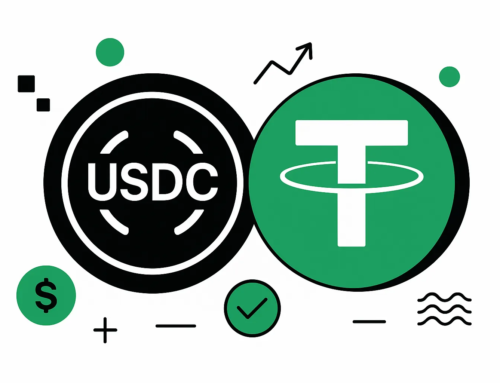What is a crypto wallet?
A crypto-wallet is a device, physical medium, programme or service designed to manage public and private keys that allow cryptocurrency transactions. It is necessary to have a cryptocurrency wallet in order to manage your money and keep it safe.
How crypto wallets work?
Crypto-wallets do not physically store cryptocurrencies. They provide the tools necessary to be able to send and receive cryptocurrencies via blockchain transactions. These consist of one or more public and private key pairs. On the basis of these, an address is generated, consisting of an alphanumeric identifier. It essentially corresponds to a specific account on the blockchain to which coins can be sent. This means that you can share your address with others in order to receive funds from them, but you must not reveal your private key to anyone. In fact, the private key allows the key holder to dispose the linked cryptocurrencies, regardless of the medium being used. So even if your computer or smartphone is compromised, you can still access your funds using another device, as long as you remember your private key. If the private key of your account is known to a third party, they can operate as if they were the owner of the account. The role of crypto wallets is therefore very important not only for operating your funds but also for their security.
Types of crypto wallets
There are two types of crypto wallets: hot wallets and cold wallets.
Hot wallets
Hot wallets are digital cryptocurrency wallets that operate on Internet-connected devices. This type of wallet is the most popular. One of the reasons for this is that you can get them at lower prices, or for free. In addition, hot wallets are quite easy to set up and funds are quickly accessible. Their use therefore is very convenient for users.
Hot wallets are software wallets that can be installed on computers and smartphones or accessed via a browser, without downloading anything. A certain degree of security is usually guaranteed, but it is still advisable to consider using tools to protect against hacks and viruses.
Online wallets
Online wallets operate in the cloud and can be accessed through a browser from any device at any time. They are the most popular and the easiest to use, but the data they contain is under the control of a third party, as the platform providing them. This makes them more vulnerable to hacker attacks.
Desktop wallets
A desktop wallet is a software wallet that can be downloaded to a computer. Unlike web-based wallets, desktop wallets give the user full control over the keys and therefore user’s funds. When a desktop wallet is generated, a file containing the private key information used to access the cryptocurrency addresses will be stored on the computer. The user can also export the private key so that he can access his funds from other devices. In general, desktop wallets are considered more secure than most web versions. An example of a desktop wallet is Electrum Bitcoin Wallet.
Mobile wallets
Mobile wallets work in a similar way to desktops, but are specifically designed as smartphone applications. They are convenient because they allow the user to send and receive cryptocurrencies through the use of QR codes. As such, mobile wallets are useful for making everyday transactions and payments. They are therefore suitable for spending Bitcoin and other cryptocurrencies in the real world. Trust Wallet is an important example of a mobile cryptocurrency wallet. Just like computers, however, mobile devices are vulnerable to viruses. It is therefore important to encrypt the mobile wallet with a password and back up the private keys. They are riskier than desktop wallets due to the fact that mobile devices are more likely to be stolen or lost.
Cold wallets
Unlike hot wallets, cold wallets are not accessible via the Internet, but work ‘offline’. They are physical devices in which the keys to access one’s funds are securely stored. Cold wallets use a physical medium to store keys offline, making them more resistant to online hacking attempts. This method is also known as ‘cold storage’ and is particularly suitable for long-term investors or for users who have large amounts of cryptocurrency.
Hardware wallets
Hardware wallets are physical and electronic devices that use a random number generator (RNG) to generate public and private keys. The keys are then stored in the device itself, which is not connected to the Internet. As such, hardware storage constitutes a type of cold wallet and is considered as one of the most secure alternatives. On the other hand, they tend to be less user-friendly and it is much more difficult to access and manage funds than hot wallets. Some of these hardware devices are equipped with a USB interface and can therefore be connected to a PC to be able to access the content when performing operations on the blockchain.
Paper wallets
A paper wallet is a physical piece of paper on which a cryptocurrency address and its private key are printed in the form of QR codes. One of the main problems with paper wallets is that they are not suitable for sending funds partially, but only the entire balance at once. Only by sending coins temporarily to a software wallet is it possible to spend the desired part of the funds, and then return the remaining money to the paper wallet. MyEtherWallet is a universal system to create a paper wallet for Etherum. Bitcoin Paper Wallet Generator instead generates paper wallets for Bitcoin.
This type of wallet is less and less used mainly due to the ease with which the paper can be damaged and thus become unreadable.
Conclusions
Crypto wallets are a fundamental part of the use of cryptocurrencies. They are one of the indispensable elements of the network and make it possible to send and receive funds via the blockchain. As it has been pointed out, each type of wallet has its advantages and disadvantages, so it is essential to understand in detail how they work and what your needs are in terms of security and usage before choosing one to manage your funds.
Another aspect to consider is that not all wallets can handle every type of cryptocurrency. Therefore, a user should choose a wallet that supports the cryptocurrencies he wants to trade with.
Interested in adopting cryptocurrency? Start using Monetum Exchange today.








